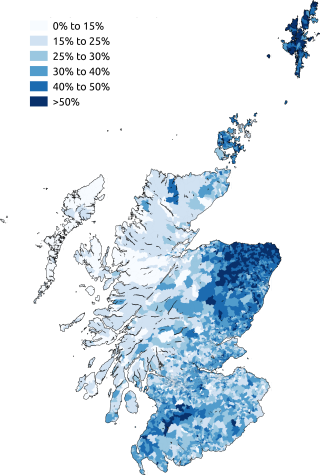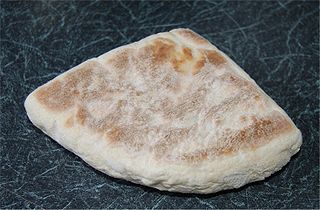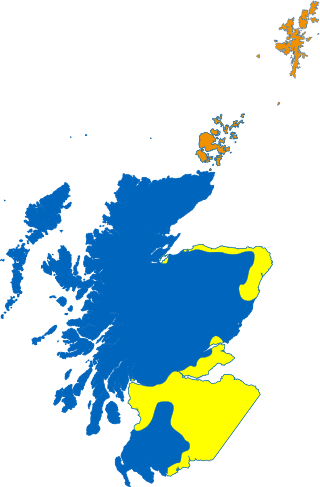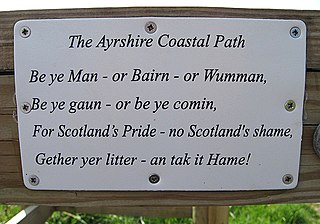
Hogmanay is the Scots word for the last day of the old year and is synonymous with the celebration of the New Year in the Scottish manner. It is normally followed by further celebration on the morning of New Year's Day and, in some cases, 2 January—a Scottish bank holiday. In a few contexts, the word Hogmanay is used more loosely to describe the entire period consisting of the last few days of the old year and the first few days of the new year. For instance, not all events held under the banner of Edinburgh's Hogmanay take place on 31 December.

Loch is a word meaning "lake" or "sea inlet" in Scottish and Irish, subsequently borrowed into English. In Irish contexts, it often appears in the anglicized form "lough".

The letter yogh (ȝogh) was used in Middle English and Older Scots, representing y and various velar phonemes. It was derived from the Insular form of the letter g, Ᵹᵹ.

Scots is an Anglic language variety in the West Germanic language family, spoken in Scotland and parts of Ulster in the north of Ireland. Most commonly spoken in the Scottish Lowlands, Northern Isles, and northern Ulster, it is sometimes called Lowland Scots to distinguish it from Scottish Gaelic, the Goidelic Celtic language that was historically restricted to most of the Scottish Highlands, the Hebrides, and Galloway after the sixteenth century; or Broad Scots to distinguish it from Scottish Standard English. Modern Scots is a sister language of Modern English, as the two diverged independently from the same source: Early Middle English (1100–1300).
Scottish English is the set of varieties of the English language spoken in Scotland. The transregional, standardised variety is called Scottish Standard English or Standard Scottish English (SSE). Scottish Standard English may be defined as "the characteristic speech of the professional class [in Scotland] and the accepted norm in schools". IETF language tag for "Scottish Standard English" is en-scotland.

A farl is any of various quadrant-shaped flatbreads and cakes, traditionally made by cutting a round into four pieces. In Ulster, the term generally refers to soda bread and, less commonly, potato bread, which are also ingredients of an Ulster fry.
Craic or crack is a term for news, gossip, fun, entertainment, and enjoyable conversation, particularly prominent in Ireland. It is often used with the definite article – the craic – as in the expression "What's the craic?". The word has an unusual history; the Scots and English crack was borrowed into Irish as craic in the mid-20th century and the Irish spelling was then reborrowed into English. Under either spelling, the term has attracted popularity and significance in Ireland.

Ulster English, also called Northern Hiberno-English or Northern Irish English, is the variety of English spoken in most of the Irish province of Ulster and throughout Northern Ireland. The dialect has been influenced by the Ulster Irish and Scots languages, the latter of which was brought over by Scottish settlers during the Plantation of Ulster and subsequent settlements throughout the 17th and 18th centuries.
In Scotland, a wirry-cow is a bugbear, goblin, ghost, ghoul or other frightful object. Sometimes the term is used for the Devil or a scarecrow.
Draggled sae 'mang muck and stanes, They looked like wirry-cows

Early Scots was the emerging literary language of the Early Middle English-speaking parts of Scotland in the period before 1450. The northern forms of Middle English descended from Northumbrian Old English. During this period, speakers referred to the language as "English".
The Dictionary of the Scots Language (DSL) is an online Scots–English dictionary, now run by Dictionaries of the Scots Language, formerly known as Scottish Language Dictionaries, a registered SCIO charity. Freely available via the Internet, the work comprises the two major dictionaries of the Scots language:
The 'apologetic' or parochial apostrophe is the distinctive use of apostrophes in some Modern Scots spelling. Apologetic apostrophes generally occurred where a consonant exists in the Standard English cognate, as in a' (all), gi'e (give) and wi' (with).
Central Scots is a group of dialects of Scots.
The Scottish National Dictionary Association (SNDA) was founded in 1929 to foster and encourage the Scots language, in particular by producing a standard dictionary of modern Scots. This primary aim was fulfilled in 1976 with the completion of the 10-volume Scottish National Dictionary (SND), covering the language from 1700 to 1976. Material for SND is drawn from a wide variety of written and oral sources of Lowland Scots from Shetland to Ulster. SND was produced under the editorial direction of William Grant, and of David Murison.
A Scotticism is a phrase or word, used in English, which is characteristic of Scots.

Scottish Canadians are people of Scottish descent or heritage living in Canada. As the third-largest ethnic group in Canada and amongst the first Europeans to settle in the country, Scottish people have made a large impact on Canadian culture since colonial times. According to the 2016 Census of Canada, the number of Canadians claiming full or partial Scottish descent is 4,799,010, or 13.93% of the nation's total population. Prince Edward Island has the highest population of Scottish descendants at 41%.
These lists of English words of Celtic origin include English words derived from Celtic origins. These are, for example, Common Brittonic, Gaulish, Irish, Scottish Gaelic, Welsh, or other languages.

Modern Scots comprises the varieties of Scots traditionally spoken in Lowland Scotland and parts of Ulster, from 1700.

A maud is a woollen blanket or plaid woven in a pattern of small black and white checks known as Border tartan, Shepherd's check, Shepherd's plaid or Galashiels grey. It was in common use as an item of clothing in the southern counties of Scotland and the northern counties of England until the early twentieth century.









